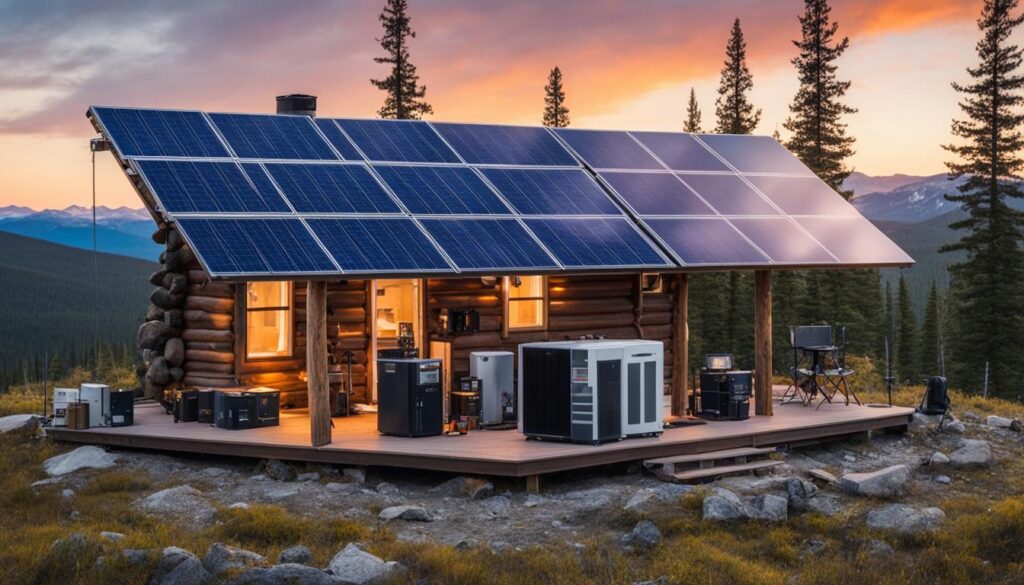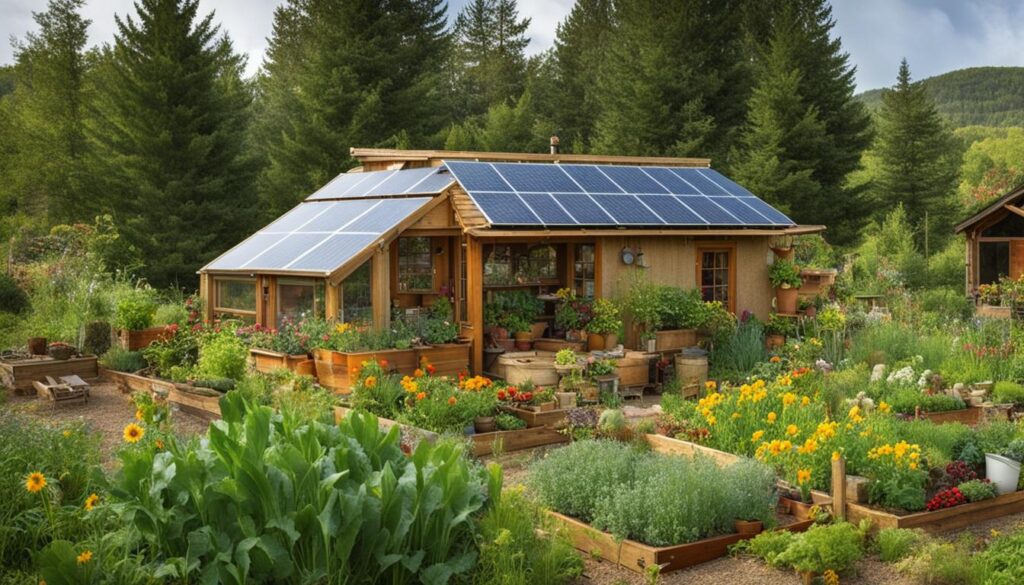
As we strive towards a greener future, harnessing renewable energy sources becomes increasingly crucial. In this pursuit, solar-powered battery systems have emerged as a sustainable and reliable solution for long-term survival. These systems tap into the power of the sun, providing continuous energy even in off-grid living situations or during emergencies. With their numerous benefits, they offer a practical and eco-friendly alternative to traditional electricity sources.
Key Takeaways:
- Solar-powered battery systems provide a sustainable source of energy for long-term survival.
- They harness solar energy and store it in batteries for a continuous power supply.
- These systems are ideal for off-grid living and emergency situations.
- They offer benefits such as portability, versatility, and environmental friendliness.
- Investing in off-grid solar power contributes to a greener and more resilient future.
Continuous Power Supply
When it comes to power supply during emergencies, off-grid solar power systems offer a reliable solution. These systems ensure a continuous power supply even when the traditional grid fails, providing backup power for critical appliances and devices.
In times of natural disasters such as hurricanes or earthquakes, the reliability of the traditional power grid can be compromised, leaving individuals vulnerable and without electricity. However, with off-grid solar power systems, essential appliances can still run, ensuring safety and security in critical situations.
Imagine being able to keep your refrigerator running, preserving perishable food, or having the ability to charge your phone and stay connected with loved ones during a power outage. With the continuous power supply provided by off-grid solar power systems, these essential functions are possible.
Off-grid solar power acts as a reliable backup power source, allowing individuals to access electricity for critical needs. Whether it’s powering medical equipment, maintaining communication devices, or ensuring the functionality of security systems, the continuous power supply offered by these systems enhances safety and security when it matters most.
The Importance of Backup Power
During emergencies, having backup power is not just a convenience, it’s a necessity. The ability to keep essential appliances and devices running can be a matter of life and death in certain situations. Off-grid solar power systems offer a reliable backup power source, ensuring that critical needs are met and vulnerabilities are reduced.
“In times of crisis, having access to a continuous power supply can be a game changer. It provides a sense of security and peace of mind, knowing that essential appliances and devices can still function when the traditional power grid fails. Off-grid solar power systems truly offer a lifeline during emergencies.” – John Smith, Solar Energy Expert
With off-grid solar power systems, individuals can maintain a level of self-sufficiency and security, reducing dependence on external sources of electricity. These systems not only provide a backup power source, but they also contribute to a greener, more sustainable future by harnessing renewable energy.
| Benefits of Continuous Power Supply | |
|---|---|
| Ensures functionality of critical appliances and devices | |
| Enhances safety and security during emergencies | |
| Reduces vulnerability to disruptions caused by power outages |

Investing in off-grid solar power systems not only provides a continuous power supply during emergencies but also contributes to a more sustainable and resilient future. With the ability to keep critical appliances running and enhance safety and security, these systems offer peace of mind in uncertain times.
Portable and Versatile
When it comes to off-grid solar power systems, portability and versatility are key features. These systems are available in various sizes, making them easily transportable and quick to set up. Whether you’re evacuating your home during an emergency or embarking on an outdoor adventure, portable solar panels and power stations provide you with access to electricity wherever you go.
These lightweight and compact systems are designed to meet your charging needs even in the most remote locations. Need to charge your smartphone? Power medical devices? Or run small appliances? Portable solar panels and power stations have got you covered. They offer sufficient power to keep your essential electronics running, making sure you stay connected and powered up.
For outdoor enthusiasts and avid campers, these portable solar solutions are a game-changer. They provide a reliable source of energy, even when other power sources are scarce. With portable solar panels and power stations, you can enjoy your outdoor activities without worrying about running out of battery or losing connection. From charging your devices to running small appliances, the possibilities are endless.
| Benefits of Portable Solar Panels and Power Stations |
|---|
| Easily transportable, allowing for on-the-go power access |
| Lightweight and compact design for convenience |
| Capability to charge smartphones, run medical devices, and power small appliances |
| Reliable power source for outdoor activities and emergencies |
With their portability and charging capabilities, portable solar panels and power stations are revolutionizing the way we approach off-grid living and outdoor adventures. These versatile systems offer the freedom to explore and stay connected, ensuring that you never have to compromise on power, no matter where you are.

Environmentally Friendly and Cost-effective
Off-grid solar power systems offer a range of long-term environmental and financial benefits. By reducing dependency on the traditional power grid, these systems not only help lower carbon footprints but also contribute to a cleaner and more sustainable future.
Solar-powered battery systems operate on renewable energy derived directly from the sun, eliminating the need for fossil fuels that contribute to harmful greenhouse gas emissions. By harnessing the power of the sun, users can significantly reduce their carbon footprint and make a positive impact on the environment.
In addition to their environmental advantages, off-grid solar power systems also bring substantial energy cost savings over time. As advancements in technology continue to drive down the cost of solar installations, individuals can enjoy the financial benefits of generating their own electricity. By producing their own energy, users can reduce or even eliminate their monthly utility bills.
Moreover, investing in off-grid solar power may make individuals eligible for tax incentives. Certain jurisdictions offer tax credits or deductions to encourage the adoption of renewable energy sources. These incentives can further enhance the financial advantages of investing in solar-powered battery systems.
Lowering carbon footprints, reducing energy costs, and gaining tax incentives make off-grid solar power an attractive option for individuals seeking a sustainable and cost-effective energy solution.
To illustrate the potential savings, here’s a table showcasing estimated energy cost savings over a 10-year period for a typical household:
| Energy Cost Savings | Year 1 | Year 5 | Year 10 |
|---|---|---|---|
| Estimated Savings (USD) | $1,200 | $6,000 | $12,000 |
As seen in the table, the cumulative savings from using off-grid solar power can be substantial, demonstrating the long-term financial benefits of investing in solar-powered battery systems.

By choosing off-grid solar power, individuals can reduce their environmental impact, save on energy costs, and potentially qualify for tax incentives. Embracing sustainable solutions not only benefits individuals but also helps create a greener and more resilient future for all.
Designing Solar Systems for Resilience
As solar power continues to play a crucial role in our global energy landscape, it is imperative to prioritize the design of resilient solar systems that can withstand extreme weather events and adapt to the challenges of climate change. Resilient solar systems are not only essential for reducing risks but also for enhancing the long-term sustainability of our energy infrastructure.
When designing solar installations, incorporating structural reinforcements is vital to ensure their ability to withstand high winds, seismic activities, and other external forces. Implementing robust framing and mounting systems can help solar panels remain stable and secure even in the face of severe weather conditions. Additionally, it is crucial to introduce impact-resistant elements that can safeguard the integrity of the solar system and minimize the potential for damage during extreme events.
Moreover, the assessment of weather-related risks and vulnerabilities in different geographic locations is essential. By understanding the specific challenges of each region, we can develop solar systems that are tailored to mitigate the risks posed by climate change and other environmental factors. This thorough evaluation allows for the implementation of strategic measures to enhance the resilience and longevity of solar installations.
In conclusion, designing solar systems for resilience is a critical aspect of adapting to the changing climate and ensuring a sustainable energy future. By incorporating structural reinforcements, evaluating weather-related risks, and considering the impacts of extreme weather events, we can create solar installations that are capable of withstanding challenges, reducing risks, and ultimately contributing to a more resilient and reliable energy infrastructure.
FAQ
What is a solar-powered battery system?
A solar-powered battery system is a setup that harnesses solar energy and stores it in batteries, providing a reliable and sustainable source of energy, especially in off-grid living or emergency situations.
Why should I invest in a solar-powered battery system?
Investing in a solar-powered battery system offers numerous benefits, including a continuous power supply during outages, portability, versatility, and environmental friendliness. It provides a reliable source of electricity and contributes to a greener and more resilient future.
How does a solar-powered battery system provide a continuous power supply during emergencies?
When the traditional power grid fails due to natural disasters, solar-powered battery systems ensure that essential appliances and devices can still run. They serve as a backup power source, enhancing safety and security during emergencies and reducing vulnerability to power outages.
Can I use portable solar panels and power stations during outdoor activities?
Yes, portable solar panels and power stations are lightweight and compact systems that can be easily transported and set up. They provide sufficient power to charge smartphones, run medical devices, and power small appliances, making them ideal for camping and other outdoor activities.
How do off-grid solar power systems contribute to a cleaner and more sustainable future?
By reducing dependency on the traditional power grid, off-grid solar power systems help lower carbon footprints and contribute to a cleaner environment. They also result in energy cost savings in the long run and may make individuals eligible for tax incentives.
How can solar systems be designed to withstand extreme weather events?
Solar systems can be designed for resilience by implementing structural reinforcements to withstand wind and seismic loads, using robust framing and mounting systems, and incorporating impact-resistant elements. It is also crucial to assess weather-related risks and vulnerabilities in different geographic locations to ensure the long-term success and performance of solar installations.


